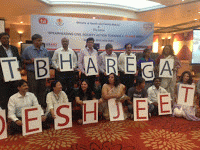Recently a TB partners and civil-society organizations (CSOs) consultation meet was held in Delhi for 'Spearheading Civil Society Action Towards a TB-Free India', with a view to align campaign objectives and goals with partners by sharing solutions and discussing way forward on existing gaps or challenges in implementing the Call to Action (C2A) for a TB-Free India.
The C2A (a component of USAID-funded Challenge TB project of the International Union Against Tuberculosis and Lung Disease - The Union) aims to engage and mobilize multiple stakeholders including private-health sector, corporate sector, civil society, media, academia and the community to achieve this aspirational goal.
Undoubtedly, civil society is an integral part of the Revised National Tuberculosis Control Programme (RNTCP) of India and has helped by generating awareness at the peripheral level by taking the programme to the patients' doorsteps. Several speakers at the meet reiterated the importance of active participation and involvement of the affected community with the RNTCP to help realize the dream of a TB-free India. While the patient has to be is central to all the actions, civil society can act as an interface between the RNTCP and the community.
As a senior government representative said, 'the government cannot be the sole provider of services but can definitely be an enabler of service provision.'
Lack of trust?
And yet there seems to be a lack of trust between the government and CSOs. This needs to be bridged so that the partnership between the two become 'constructive enough to be productive.' NGOs/CSOs should be involved with the government in the planning as well as implementation and monitoring stages. Implementation strategy needs to be well planned and not be an ad hoc process. Only then the partnership can be meaningful and effective. As Dr Neeraj Kulshrestha, Additional Deputy Director General (DDG) at Central TB Division of India, pointed out, "There is lack of trust between government and civil society. This needs to be bridged. Both partners need to be more flexible as rigidity is not going to help anyone. A realistic costing of services has to be developed. But above all, CSO activities should be aligned with RNTCP policies."
Lamenting that while India harbours one-third of the global TB burden, it also has an unreached population of 1 million TB patients who are missing from the government programme. Dr Sunil Khaparde, Deputy Director General at India's Central TB Division (CTD), said that the marriage between government and civil society should benefit the affected community. He called poverty, illiteracy, and malnutrition the social pathology of TB that needed as much attention as TB treatment. For this social support schemes should reach those in need of them down to the Panchayat level as this support is crucial for treatment adherence. While lauding the successful model of RNTCP, he admitted that a lot more needs to be done.
"We cannot work in silos"
(Note: You can view every article as one long page if you sign up as an Advocate Member, or higher).






